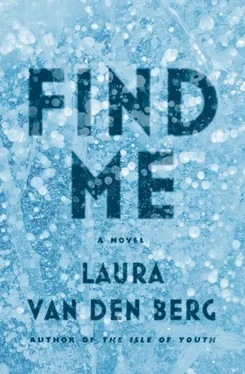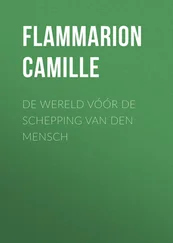* * *
A small group of patients insists on guarding the Dining Hall. Others wander back to their rooms or the Common Room, where they sit in front of the blank TV, awaiting further instruction. Others travel down to the basement, hoping to figure out the code, but then they look through the triangular window and see the white ocean outside and go back upstairs. In the Hospital, we are far away from everything.
I’m walking the third-floor hallway when I hear a sound coming from the supply closet. I open the door and find N5 sitting there.
She’s pressed into a corner, next to a plastic caddy filled with cleaning supplies. Behind the shield her eyes are bloodshot. She’s holding on to her shins and I can see the shapes of her knuckles through the gloves. She blinks at me. Each breath is long and gasping. I look down at her and wonder what the consequences of abandoning Dr. Bek will be.
“It’s over,” I say. It’s strange to see a member of the staff looking so small and vulnerable, so human. “Everything is calming down.” I am surprised by my desire to help.
“I don’t understand why you’re doing this to us,” she cries. Her lids disappear. Her eyes grow wide. “We’re not even real doctors.”
* * *
The patients give up their rebellion when they realize nothing works in the Hospital without Dr. Bek and his staff. The Dining Hall stays locked. There is no other place for us to get food. There is no Lights Out. The fluorescent overheads burn through the night. The few patients intent on guarding the Dining Hall sleep on the floor and wake feeling cold and hungry and stiff. In the morning, they go back to their floors, to their rooms, and wait for their morning examinations. No one comes.
Louis and I drink water from the bathroom tap. We knead our aching stomachs. We give each other an exam. Louis pantomimes administering a shot. I sit on my mattress. His fingers form an imaginary needle. He takes my arm and nudges the delicate purple skin, a fake needle looking for a real vein.
“This won’t hurt.” He frowns at my arm. “Hold still. Let us help you.”
A sure sign it’s going to hurt? The more a person tells you it won’t, the more you can be certain it will.
“Owww,” I say.
We peek beneath scrubs and down throats. His throat is a dark moist tunnel. When I look under his scrubs, I see the flat white of his stomach, the soft blond fuzz. We palm foreheads and peel back eyelids. We do the Romberg. It feels good to be close to him.
Once we are touching each other, how can we be expected to stop? Soon I am flat against his bed, my scrubs around my ankles. My legs are parting and then he is on top of me, pushing. It’s daytime and there is no lock on the door, so we are quick, but I will never forget the feeling of blood flooding my body or our hot grasping hands or the way his eyes rolled back as we slipped into a place where time has no meaning, where we forget all about hunger, where we are so completely alive it seems impossible that we will not live forever.
* * *
All day the staff remains invisible. The patients are silent and drifting. The Dining Hall is still locked. We have not eaten in twenty-four hours. There are no meditations. I go back to the third floor and look for N5 in the supply closet, but there’s just the caddie stuffed with rags and spray bottles. I begin to worry they have left us for good.
From the Common Room window, I watch the sky go dark. I can still smell Louis in my hair and on my fingers. I can’t stop wondering where my mother is right now.
Is she happy? Is she alone? Is she glad to be alive?
You might think we the patients would band together and make our own kingdom. You might think we would figure out a way to leave the Hospital, to trek into the closest town, La Harpe, or at least find a way into the Dining Hall. In December, when Floor Groups four and six threw around the trays, there was a leader. This time around, the patient from California is holed up in his room. He wants no part in leadership and no other leader has emerged. Still, there are seventy-four patients, the better part of a hundred. Isn’t this what we wanted, freedom from the rules? Why aren’t we doing anything useful with that freedom? What is wrong with us?
The longer the staff stays missing, the more patients I see curling up in corners or wandering aimlessly under the lights. Everyone starts taking on the same blank expression, the look of a child who has been left behind in a shopping mall, the look that knows there are all these people here but they are not the right people — where have those right people gone? How can I get them to come back?
Under the hallway lights, I read the twins’ palms in the way that Marcus taught me. From their thumbs, I can tell them about the division between will and logic and that they both fall on the side of will. The fingers of Saturn are longer than the fingers of Apollo. I can’t find Sam’s life line and instead of the truth I tell him his is as strong a line as I have ever seen.
That evening, the Pathologist’s voice washes over the floors. I look up at the speakers, hopeful. I remember the evangelical church in Somerville and wonder if this is what it feels like to be called by God, to hear a voice and peer into the lights above and know at once what it is you’re supposed to be doing with your life — which is, in my case, to proceed immediately to the Dining Hall.
In the Dining Hall, I find patients lining up for red trays. The line is straight and slow. There is no pushing, no laughing or screaming, no accusations of cutting. The windows are dark. Dr. Bek and the nurses stand against a wall, silent, watching. They have nothing to say to us. Already I can see our Floor Group cleaning the Common Room, erasing the evidence of what we’ve done.
Louis is there. He touches my hip. Together we fall into line.
I don’t tell him what N5 said to me in the closet. Her words are too large and slippery to make the journey from thought, from memory, to speech.
The staff left us alone just long enough for us to imagine a life without their oversight, a life of hunger and bathroom tap water and an endless wait for spring and maybe even cannibalism. I read all about the Donner Party in the Hospital library: I know what hungry people can become capable of. We thought time moved slowly before, but it was nothing compared to the way time moved without exams and meals and activities and testing. If you have no way to mark the hours, no variance in the days, time will open its mouth and swallow you.
* * *
After Lights Out, I hear the same scratching sound next door, but this time I get out of bed and investigate. In the twins’ room, I find the boys by the hole. Sam is holding a flashlight. Christopher is pecking at the ground with a big metal spoon, the kind of serving spoon I’ve seen before in the Dining Hall.
“Where did you get that ?” I whisper.
“We stole it,” the boys whisper back.
The medicine cabinet blocks the bathroom entrance. Linoleum squares are piled nearby like shed skin. Sam points the flashlight at the hole and I am astonished by the size. The opening is as large as a car tire. I move closer and feel grit on the bottoms of my feet and think about how long it’s been since I’ve touched the outdoors.
I remember: snow in my eyelashes, grass sticking to my elbows, dirt on my knees.
The boys are crouched like rabbits around the hole, wide-eyed and pale. The freckles on their throats look like a spreading rash. Christopher holds the spoon in midair. I can hear their quick, panting breath. Sam shines the flashlight in my eyes and they become hidden behind a bright white wall.
“You can’t leave.” I raise a hand to block the glare. For starters, no one knows the keypad codes. For starters, the weather. The light stays on me and I try to find the boys in it.
Читать дальше












